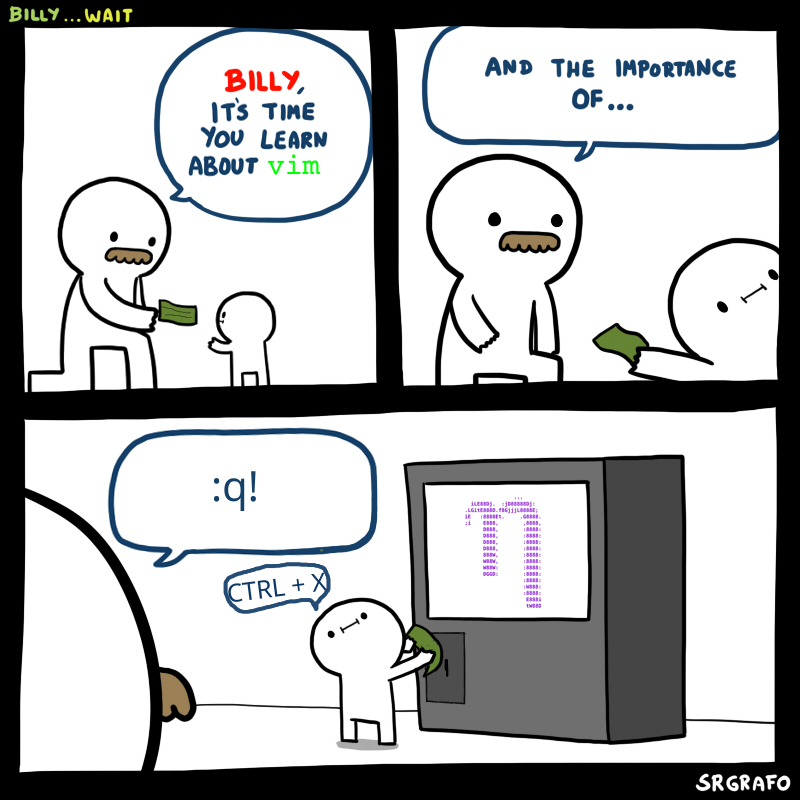well, I am using vim, but I don't know how to use vim.
Am I vimming?
Welcome to Programmer Humor!
This is a place where you can post jokes, memes, humor, etc. related to programming!
For sharing awful code theres also Programming Horror.
well, I am using vim, but I don't know how to use vim.
Am I vimming?
Yes, you vom.
They vom it.
If you dont know how to exit vim, then yes you are...
:what^C^C^C^Z^Z^C^ESCFFUUUUUUUUUU...
I remember that experience first time and how I had to kill the process from another shell :)
This was before the internet so couldn't exactly google it either.
Fun times. But I figured it out by reading the man page.
Escape, :wq!
Escape enters command mode
: prompts the command
W = write
Q = quit
! forces it

unrepentant nano gang rise up

Emacs users be like
I'm always vimming!
Not because I want to though. It's because I don't know how to stop...
Tried neovim a couple of times. Stopped after 10 or 15 mins. Anyone has useful tips to get used to vim/neovim?
Just get used to
Don't try to do it all at first, just get comfortable with the essentials. You can even just stay in insert mode (the only mode in most editors) at first.
Keep a vim basics cheat sheet handy for a couple weeks as you're building in muscle memory, then slowly work in more advanced techniques and combinations.
It doesn't take long before you start having a lot of fun just manipulating text.
PS here's a decently basic cheat sheet I found:

I always forget about :wq, mainly because escing out of interactive mode and hitting ZZ is so much quicker.
Go through the tutorial. It is quite good and teaches things incrementally with real world examples. Just run vimtutor to start.
I became a fan after I got used to nice color schemes, buffers/tabs, horizontal/vertical splitting, file browsing with NERDTree and highlighting changes with GITGutter.
You ask for tips? Add VIM commands you use regularly (like paste mode toggle for example) to a keyboard shortcut (like leader key + p) in your .vimrc settings file. It increases working speed.
Also add some plugins, they are fun and add useful functions from other editors like Sublime (ctrl-p, vim-multiple-cursors).
There are plenty of cheat sheets online. The main thing is understanding that there are different modes, knowing what they do, and how to switch between them and issue commands.
The first time I used VI I typed a few characters, then hit backspace to delete some characters. Backspace doesn't delete characters. I closed VI and never opened it again.
Yeah yeah, brag about being able to close VI the first time of use...
But how did you close it?
Carpenter's axe to the utility line outside my house
As a long-time vim enjoyer, I like your gusto. Imagine if you could apply regexes to that carpenter's axe.
(Also, what sort? Do you have one of those awesome Gransfors Bruks ones?)
You need to type i first to enter insert mode.
hides in Kate and a Codium-based IDE

I kakoune instead.
fellow noun->verb user :)
helix superiority however.
Pitch me. I could switch, but it would help a great deal to understand more about why. I'm open to change, but not eager to change.
🪢 :q!
Progress lost
Sorry bub, but you just wasted your time
Sorry for living under a rock, but what is vim?
It's a text editor. It all began with the ed editor, which is very simple and does one thing, it edits files. Then someone extended it into the ex editor. Then someone added a new feature: being able to visually see the file you're editing, which became vi, the visual editor. Then someone improved that, into vim. What began as an editor where you needed to be fluent in regular expressions but otherwise was simple, is now a very complex editor, moving the functionality of the old UNIX tools into the editor itself.
Thank you for explaining!
It's also available on nearly every unix-like machine since the 70s. So, super useful to know how to use. I personally also like (neo)vim as an IDE and its optional regex functionality because that allows once to efficiently edit massive files with minimal effort.
Vi or die!
i do all my vimming in visual studio code
https://marketplace.visualstudio.com/items?itemName=vscodevim.vim
I prefer https://marketplace.visualstudio.com/items?itemName=asvetliakov.vscode-neovim since emulators are generally not 1:1 compatible in the most unexpected places.